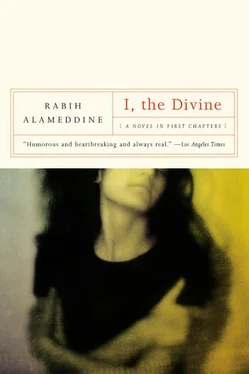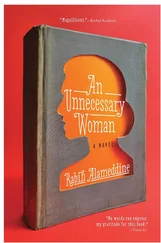“Oh, my god.” My stepmother jumped up, ran and stood right underneath me with her hands held up to catch me. “Sarah Nour el-Din. Get down here this instant.”
“I want to get some grapes.”
“What are you doing up there, Sarah?” My father asked me this while I hung ten feet from the ground. I noticed he still sat in his seat. My grandfather was chuckling.
“Let go, Sarah,” my stepmother said. “I’ll catch you.”
“I want to get some grapes.”
“I’ll get you some. We get them by using a ladder, not by climbing the vines. I don’t want you to hurt yourself. Now, just let go.”
“You look like a little monkey, my little Sarah,” my grandfather said.
I let go and dropped into my stepmother’s arms. “Don’t you ever do that again,” my stepmother chided. “You can get killed. Girls don’t climb trees.”
“Are you going to get me some grapes?”
She shook her head in despair, still unsure what to do with me. “Okay. I’ll get some for everybody.”
By the time she came back with the ladder and a pair of shears, I was in my grandfather’s lap. I knew the story he would tell. I had climbed the pergola. I was called down. There was only one story he could tell now: The Prince of Believers.
“Who was the boy that climbed trees?” he asked me.
“The Egyptian boy.”
“What was his name?”
I racked my brain, but could not remember. I knew the story, but the medieval Arabic names were completely foreign to me. “The Caliph,” I said.
“He was the Caliph, but that was not his name. A caliph is like a prince. It’s not a name. Don’t worry, my little one. I’m sure even your father and uncles don’t know his name. That’s because they don’t care where they came from.”
“I know his name,” my father interjected.
“Al-Hakim bi-Amrillah,” one of my uncles said.
“See. I told you they wouldn’t know because they don’t pay attention. Not like you. His name was al-Mansour. He was only eleven. This was a long, long time ago in Egypt. During the great Fatimid dynasty. The Caliph was going from Egypt to Syria to fight the bad Byzantines who wanted to come and take over our lands and make us all Christians. So the Caliph stopped in Bilbays because he felt sick. He knew he was going to die. He felt bad because unlike those Christian emperors who sat in their castles and told people what to do, our Caliph was going to join his army and fight alongside his men, but now he knew he wasn’t going to make it. So he lay in bed and he called al-Mansour, who was playing outside. The little boy came and he saw the Caliph in bed. The Caliph called him over and kissed him and hugged him like this. And everybody was there and saw the Caliph hug him. And then he told the boy, ‘Go out and play. I will be all right now. I know you’ll be a good Caliph.’ So everyone knew that al-Mansour was going to be the next Caliph.”
“And he was a star.”
“That’s right. So the little boy went out to play. After a little while, an intendant from the court, whose name was Barjawan, came out looking for the little boy. He looked and he looked, but he couldn’t find him. All of a sudden, he heard the voice of al-Mansour saying, ‘Hello, Barjawan.’ Barjawan still couldn’t see our boy. So the boy said, ‘I’m up here.’ And Barjawan looked up and saw al-Mansour playing in a sycamore tree. Barjawan said, ‘Please come down from the tree, your highness. The Caliph has gone to heaven. You are now the Prince of Believers.’ And the new Caliph came down from the tree. Everybody saw that he was an emissary from God. Then they all returned to Cairo, which the Fatimid had built. And the boy Caliph walked in front of everybody and all the people came out to see. The people realized at the same time that they loved the boy Caliph. He sat on a throne of pure gold. All the people came to pay their respects. They saw a confident Caliph with piercing eyes that could see the truth. They saw a beautiful boy with the face of a wise and learned man. They saw that the new Caliph was touched by God and his angels. The boy looked at them all and smiled upon his people. They felt his grace. And he said, ‘My name is now al-Hakim bi-Amrillah.’ You know what that means?”
“The ruler by God’s command.”
“Yes. And even though he was only a little boy, he became the greatest Caliph of all time. He was the star. He was generous and just, wise and judicious. Three months after becoming Caliph, he sent missionaries to herald the coming of a new age, which was to start when the time was ripe. In this new age, truth will be revealed and the knowledge of God was to be disclosed. That was the Call.”
“The Call for the Druze.”
“It was years later when the time was ripe and the Druze were born. Al-Hakim bi-Amrillah was older and even wiser. But even when he was a little boy, all the people could see he was special. That boy is the reason we are all here.”
“So I am the Prince of Believers.”
“You’re the Princess of Believers.”
“You keep putting these strange tales in her head,” my stepmother said, as she placed the large straw tray filled to overflowing with bunches of the sour white grapes on the table in front of all of us.
It was spring, in May, some years ago. I was visiting my sister Amal at her apartment in Beirut. A lazy afternoon, her kids playing in the den, while she and I lounged on a huge sofa. We sat facing each other, massaging each other’s feet, a favorite pastime of ours since we were children.
“I don’t understand why he loved you so,” she said wistfully, reminiscing.
“Neither do I, but I am grateful he did.”
“Are you? If you were Hitler’s favorite child, would you be grateful for his love? I’m not sure I would be.”
“He was not Hitler. I know most of you remember him differently than I do, but he was not evil. Grandfather was just quirky. He was not a bad person.”
“He was a Machiavellian asshole, prejudiced as hell, xenophobic and bigoted. You just don’t remember him well. With you, he was all kindness and warmth; with the rest of us, he was a manipulative bastard.”
“He wasn’t that bad. He just didn’t care for you as much as he did for me. I can’t explain why he cared for me so much, but he wasn’t bad with you. He just ignored you.”
“You’re so naïve sometimes. He was a misogynist. He hated all us girls. He thought all women were whores. He beat Grandmother up on a regular basis. You were just too young to remember. In any case, what he did to our stepmother alone is enough.”
“What we all did. We were all unkind to Saniya when she arrived.”
“We took our cues from him.”
“We took our cues from Father.”
“Nope. Father was willing to forgive Saniya’s inadequacies. After all, he picked her. He chose an uneducated peasant girl for a wife. He knew what he was doing. It was Grandfather who started the attacks. He turned all of us into the jeering audience. You should talk to her sometime and listen to her stories about him. It’ll give you goose bumps. He was a horrid man. He even told Lamia to her face that she would never find a husband unless she had plastic surgery. He hated women.”
“He loved Sarah Bernhardt.”
“He did not. He loved the myth, the unattainable myth of what a woman is. He had no clue who Bernhardt was. He apotheosized her. Her mother he called a whore, but according to him, Sarah lived la vie galante . Fuck that. She started out as a prostitute, like her mother, like her aunts. No metaphors, no euphemisms. She had to be a prostitute like her mother. There was no other way a woman could survive. But your grandfather probably thought she died a virgin. At least he wanted to believe so. She was born a star. Bullshit. Like any star in any age, she made it by sleeping her way to the top.”
Читать дальше












